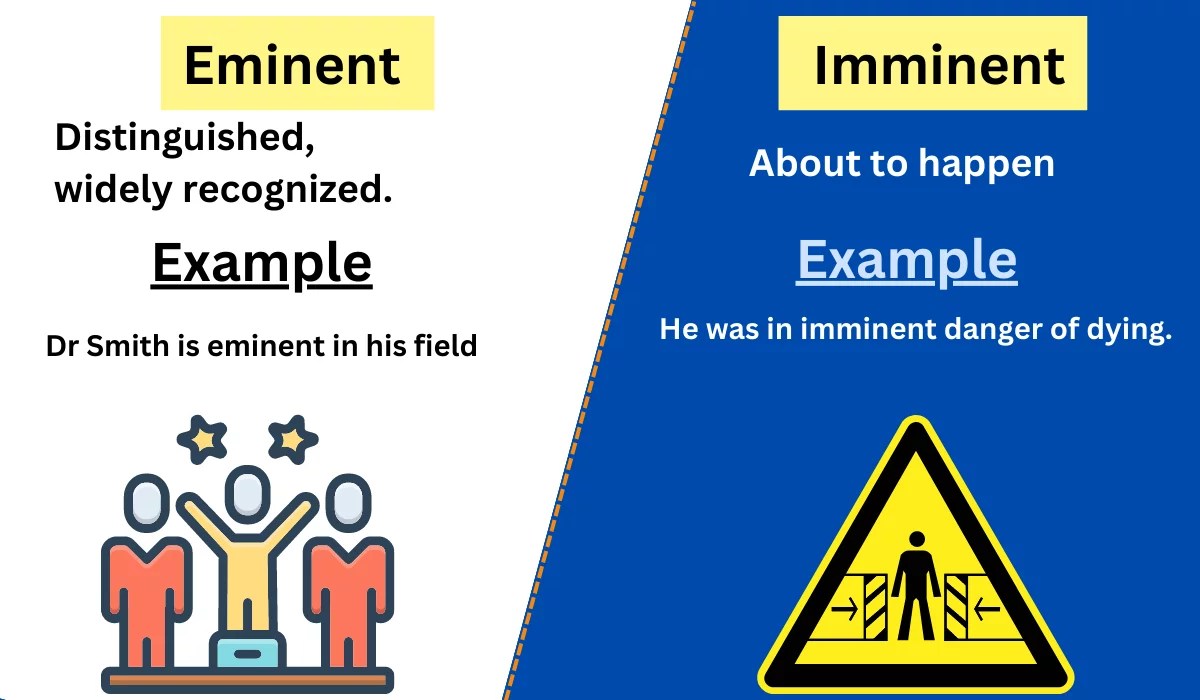In the realm of the English language, nuances can often lead to confusion, especially with words that sound similar but have vastly different meanings. One such pair is "eminent" and "imminent." While they may appear interchangeable at first glance, a closer look reveals that they serve entirely different purposes in communication. Understanding these distinctions is crucial for effective writing and speech, as misusing these terms can lead to misunderstandings.
Both "eminent" and "imminent" are adjectives that are frequently used in both formal and informal contexts. However, "eminent" refers to someone who is distinguished or outstanding in a particular field, while "imminent" pertains to something that is about to happen or is impending. This article aims to dissect these terms, providing clarity and examples to help readers navigate their meanings with confidence.
As we explore the differences between eminent and imminent, we will also look into common usage scenarios, tips for remembering the distinctions, and a few examples to illustrate their meanings. By the end of this article, you will not only understand what sets these two words apart but also be able to use them accurately in your writing and conversations.
What Does "Eminent" Mean?
The term "eminent" is derived from the Latin word "eminere," which means to stand out or be prominent. It is often used to describe individuals who have achieved significant recognition in their field, such as academics, artists, or leaders. Here are a few contexts in which "eminent" might be utilized:
- Eminent scientist: A scientist who has made groundbreaking discoveries.
- Eminent scholar: A scholar who is well-respected in academia.
- Eminent artist: An artist with a significant influence on their medium.
Examples of "Eminent" in Sentences
To better understand how to use "eminent" correctly, consider the following examples:
- Albert Einstein was an eminent physicist known for his theory of relativity.
- She was invited to speak at the conference due to her status as an eminent author.
- The eminent historian received a prestigious award for his contributions to the field.
What Does "Imminent" Mean?
On the other hand, the term "imminent" comes from the Latin word "imminere," which translates to "to overhang" or "to threaten." This word is primarily used to describe events or situations that are about to occur, often with a sense of urgency or inevitability. Here are some common scenarios in which "imminent" is applicable:
- Imminent danger: A situation that poses an immediate threat.
- Imminent arrival: When someone is expected to arrive shortly.
- Imminent change: An upcoming change that is expected to happen soon.
Examples of "Imminent" in Sentences
To illustrate the usage of "imminent," consider these examples:
- The storm is imminent, and residents are advised to take shelter.
- The announcement of layoffs was imminent, causing widespread anxiety among employees.
- The company is facing imminent bankruptcy if it does not secure funding soon.
How to Remember the Difference Between Eminent and Imminent?
One effective way to remember the difference between these two terms is by associating them with their meanings:
- Think of "eminent" as standing out ("E" for "Extraordinary") in a field.
- For "imminent," think of "I" for "Impending" to signify that something is about to happen.
How Are "Eminent" and "Imminent" Used in Context?
Using these terms correctly in context is vital for clear communication. Misusing them can lead to confusion or misinterpretation. Consider the following scenarios:
- Describing a renowned scientist: "Dr. Jane Doe is an eminent biologist who has contributed greatly to cancer research."
- Anticipating an event: "The meeting about the merger is imminent, as the deadline is approaching fast."
Why Is It Important to Distinguish Between Eminent and Imminent?
Understanding the distinctions between "eminent" and "imminent" is not just an academic exercise; it has real-world implications for effective communication. Miscommunication can lead to misunderstandings, especially in professional settings where precise language is crucial. By mastering these terms, you can enhance your writing skills and improve your ability to convey your thoughts clearly.
Can "Eminent" and "Imminent" Affect Professional Reputation?
Yes, using the correct terminology can significantly impact your professional reputation. Misusing these words in a presentation or a report may undermine your credibility. It's essential to pay attention to these details, especially in formal communication.
Conclusion: Embrace the Nuances of Language
In conclusion, the differences between "eminent" and "imminent" may seem subtle, but they are crucial for effective communication. Both words serve unique functions in the English language, and understanding their meanings can elevate your writing and speaking abilities. Whether you are discussing an eminent figure in history or an imminent event on the horizon, using these terms correctly will ensure that your message is conveyed clearly and accurately.
Final Thoughts: Where to Learn More?
If you desire to delve deeper into the nuances of the English language or improve your vocabulary further, consider exploring resources such as grammar websites, writing workshops, or language courses. The more you engage with language, the more adept you will become at navigating its complexities.
Exploring The Ownership Question: Does Shaq Own JCPenney?
Mastering The Art Of Holding A Wine Glass
Melted Smiley Face: Understanding Its Meaning And Significance


